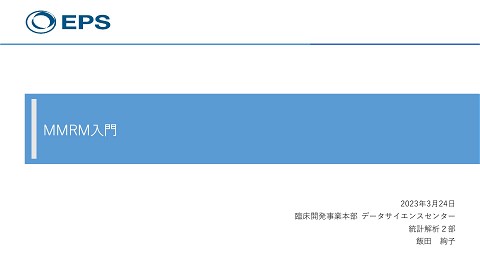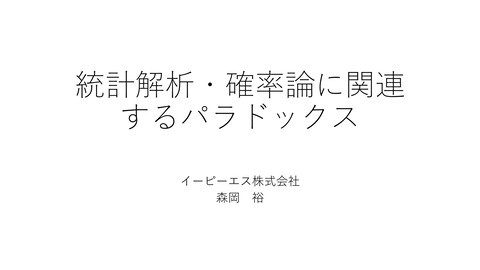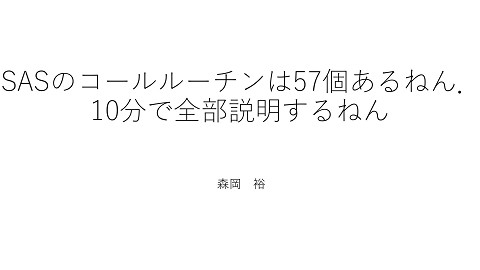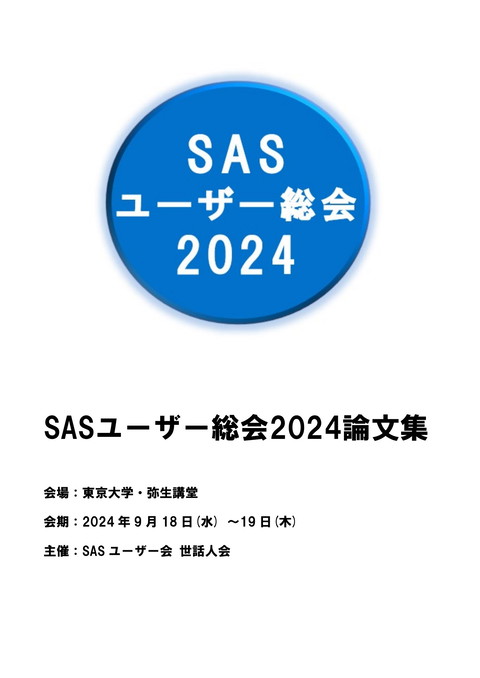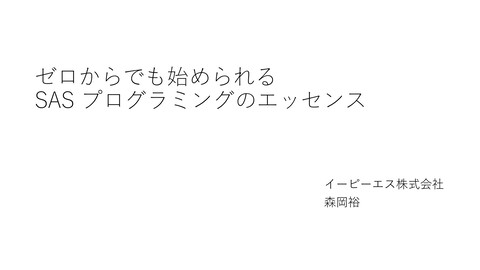Introduction to Analysing Competing risk data
791 Views
April 10, 24
スライド概要
SAS言語を中心として,解析業務担当者・プログラマなのコミュニティを活性化したいです
関連スライド
各ページのテキスト
Introduction to Analysing Competing risks data
Source • All materials are from : Using the PHREG Procedure to Analyze Competing-Risks Data (Ying So, Guixian Lin, and Gordon Johnston, SAS Institute Inc.) https://support.sas.com/rnd/app/stat/papers/2014/competingrisk2014.pdf
What is Competing-risks data? A competing-risks situation arises when • • • Individual can experience more than one type of event One event might hinder the occurrence of other types of events Only the time to failure for the earliest of these events is observed
Example of Competing-risks situations Breast cancer patients can • • • die from breast cancer censored die from causes other than breast cancer
Problems? • The product-limit estimator (K-M method), might yield biased results when analysing competing-risks data
What to do? • • One way is to use the cumulative incidence function (CIF) CIF = the probability subdistribution function of failure from a specific cause.
What is the CIF? • • The probability of failure due to cause k prior to time t. In equation 𝐹𝑘 𝑡 = 𝑃 𝑇 ≤ 𝑡, δ = 𝑘 𝑘 = 1, … 𝐾 where T = Failure time, δ = censor (0) or events (1, … K)
CIF (derivation) • • • • • • First define the cause-specific hazard function h(t) 𝑃 𝑡 < 𝑇 < 𝑇+ ∆𝑡 , 𝛿=𝑘 𝑇 > 𝑡) ∆𝑡 ∆𝑡 →0 ℎ𝑘 𝑡 = lim , 𝑘 = 1, … 𝐾 The instantaneous rate of failure due to cause k conditional on survival until time t or later Can derive following equation ℎ𝑘 𝑡 = 𝑓𝑘 (𝑡) 𝑆(𝑡) → 𝑓𝑘 𝑡 = 𝑆 𝑡 ℎ𝑘 𝑡 𝑡 Integrating both side, we get 𝐹𝑘 𝑡 = 0 𝑆 𝑢 ℎ𝑘 𝑢 𝑑𝑢 , 𝑘 = 1, … 𝐾
Define the sub-distribution hazard • • • The hazard of the CIF ℎ෨ 𝑘 𝑡 = 𝑑 𝑑𝑡 log(1 − 𝐹𝑘 (𝑡)) Not the same as the cause-specific hazard (difference in risk sets)
Apply these concepts to data!! • • DATA - Acute leukemia patients treated with bone marrow transplant. Want to find out if time until relapse is different for disease groups. This is a competing risks scenario because death is a competing factor for relapse.
Data • • • • • • Variables Time-variable: T Time until events or censor Censor variable: Status (0 censored, 1 =relapse, 2=death) Covariates: LogWaittime (wait time until transplant) Group (1= acute lymphoblastic leukemia (ALL), 2= acute myelocytic leukemia (AML) low-risk, 3= AML high-risk)
Modelling the Cumulative incidence • • • Modelling by defining the hazard of the cumulative incidence function (subdistribution hazard) Impose the proportional hazards assumption on the subdistribution hazards Can fit this model in PHREG using EVENTCODE= option in Model statement
Thank you!!
